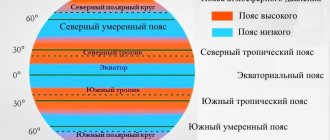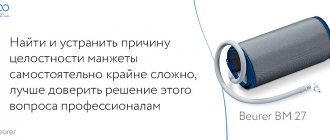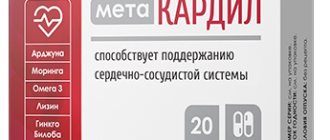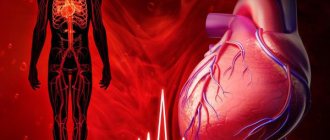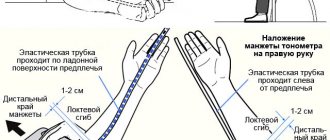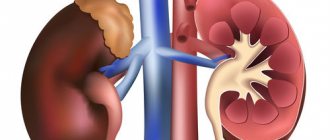Dependence of blood pressure on atmospheric pressure.
«There is no bad weather. Every weather is a blessing..."
If a person is healthy, he does not feel the changes occurring in the atmosphere. There are many weather-sensitive people around; they feel weather changes, but without pathological symptoms. For some patients, this turns into weather dependence - their well-being changes depending on the weather outside the window.
Patients with cardiovascular diseases often do not tolerate any sudden temperature fluctuations, atmospheric pressure, wind, or heat. They feel discomfort, in some cases pathological symptoms appear (blood pressure increases or decreases, pain in the joints, heart pain, etc.). Those with high or low blood pressure are more likely to suffer.
What a weather-dependent person feels: Some patients very clearly sense weather changes in the form of a “barometer”. They can accurately predict what to expect from the weather in the coming days. When atmospheric pressure changes, the patient feels:
- The head hurts, powerlessness sets in, the heart hurts.
- Performance decreases sharply.
- Lethargy.
- Blood pressure rises or falls.
- Complete apathy.
- Joints and whole body hurt
- The stomach is bloated.
- Irritability appears.
The drop in temperature outside the window is especially poorly tolerated.
- There is an exacerbation of chronic diseases.
- Attention wanders.
- Sleep is disturbed (we are either sleepy all day or we experience insomnia).
Why does a person acquire weather dependence and how to deal with it:
- We have more and more problems in our lives that we cannot or do not know how to calmly solve. This means a constant negative load on the human nervous system. “All diseases come from nerves,” everyone has heard. Immune defense sharply decreases, our body weakens.
- There are a very large number of patients with hypertension, hypotension, and dystonia. Our blood vessels are not healthy.
- Poor nutrition, immobility or low mobility, ignoring walks in the fresh air, smoking, alcohol.
- Ecologically unfavorable place to live.
How to help yourself:
A person suffering from weather dependence already knows, immediately in the morning, that such a day has arrived.
- When he wakes up, he feels tired. In such cases, it is better not to get out of bed right away - you may feel dizzy.
- Stretch a little, roll onto your stomach.
- Then get on your knees, then on all fours.
- Very carefully tilt your head from side to side, forward, back.
- Rotate with your arms and hands.
- Get down to the floor.
- You can do abdominal exercises, but if you feel very unwell, it is better to postpone it.
- Vigorous rubbing of palms against each other effectively removes lethargy. Then apply hot palms to your eyelids. Repeat three times.
- The lethargy will definitely pass.
- If you feel unwell and do not want to move, turn on your favorite music and listen to it. Choose one that will lift your mood. Perhaps after a few minutes you will want to stand up, smile, do a few movements.
- A useful procedure in the morning is to massage the ears. There are many active areas of the body here. All organs wake up from their massage. Just rub your ears, knead them.
- Ventilate the premises more often, do not be afraid of the cold. There is no oxygen in the stuffiness - this is very harmful. You are constantly apathetic, lethargic and weak in a stuffy environment.
- Go to the kitchen and start your day with a glass of water at room temperature. By doing this you will help your stomach wash away from its walls the unnecessary things that have accumulated at night.
- Be sure to take a shower, preferably a contrast shower (changing hot and cold water).
- Have breakfast, without it the weakness will not go away. Green tea and coffee with milk will help with low blood pressure. If you have high blood pressure, it is better not to drink such drinks. Drink tea from linden or chamomile, rosehip.
- You can eat boiled eggs, oatmeal porridge, bran or grain bread with a small amount of butter (if there are no contraindications). You shouldn't eat heavily.
- Meteorological dependence and how hypertensive patients can deal with it:
- Take multivitamins as prescribed; there are very few of them in our products.
- Move more, it's not just words - it's incredibly good for your health.
- Never overeat, no matter how tasty the food is.
- Adjust your sleep (there should be a dark room, silence, a clean bed, the room is ventilated, you are calm).
- Fight stress. By nightfall they should be at zero.
- Control all chronic diseases and treat them on time.
- Hypertensive patients should have more potassium in their food (berries, fruits, herbs, vegetables, nuts, only fresh fish without frying).
- Less salt, smoked meats, white flour, fat. Less fatty, red meat.
- Replace eggs, fish, and nuts with protein.
- Drink hibiscus tea - it is incredibly beneficial. Tinctures of oregano, chamomile, thyme, and motherwort will help.
- Avoid coffee and tea on such days. The pressure will definitely rise.
- Be sure to take an increased dose of the drug for high blood pressure if it does not decrease.
- Try to avoid stressful work. Don't lie down, walk slowly. Low mobility is bad for your health – it will only get worse.
Follow the recommendations given to you and stay healthy.
Prepared by general practitioner of the Slonim Central District Hospital Levkevich D.I.
Symptoms, not disease
Give it some heat: what weather saves you from coronavirus
Could a stormy summer trigger a surge in cases?
Weather dependence is usually understood as the body's reaction to sudden changes in atmospheric pressure. Despite the prevalence of this concept, it is not considered a disease in itself. Simply, pressure fluctuations intensify the symptoms of existing chronic diseases.
The most common problems faced by weather-sensitive people are headaches, dizziness, rapid heartbeat, loss of energy, mood swings, and joint problems. There may also be an increase in other chronic diseases - for example, if a person suffers from kidney problems, symptoms may become more noticeable at this time
Many doctors explain the body’s sensitivity to weather changes by the fact that in ancient times, a headache served as a kind of signal for people about an upcoming change in the weather - and therefore had a practical meaning.
Let's get promoted
Photo: Depositphotos
Now there is no need for this, so those who suffer in one way or another due to weather-related deterioration in well-being strive to reduce unpleasant symptoms.
At-risk groups
Abnormally high atmospheric pressure causes deterioration in well-being and decreased performance in a large number of patients who are grouped into several risk groups:
- in pathology of the heart and blood vessels - pressure fluctuations cause decompensation of the cardiovascular system, cerebral circulation with the development of pre-infarction conditions, pre-stroke conditions, hypertensive and hypotensive crises, atherosclerotic changes can lead to rupture of blood vessels, thromboembolism;
- for skin diseases - high air pressure dehydrates the skin, forcing it to spend a lot of energy on “heating”: the dermis dries out, peels, cracks, which aggravates chronic dermatoses, trophic ulcers, sometimes frostbite, urticaria from the cold;
- for diseases of the gastrointestinal tract - spasm of the arteries of the stomach, intestines, biliary tract, pancreas provokes an exacerbation of chronic pathologies;
- Physical inactivity - sedentary patients treat exercise as a way to cope with a cold, but hypoxia and inactivity lead to undesirable consequences: shortness of breath, surges in blood pressure, pre-infarction state;
- for respiratory diseases - COPD (obstructive pulmonary disease), bronchial asthma, exacerbation of pulmonary hypertension, provoking bronchitis, pneumonia, pulmonary failure;
- with damage to the central nervous system - post-stroke conditions can lead to repeated brain damage, provoke depression, suicidal thoughts;
- in case of mental illness - air vibrations provoke psychoses, psychoneuroses, exacerbations of schizophrenia, manic-depressive states.
Consequences of meteorological changes
Robin Cook, the former British Foreign Secretary, died of a heart attack in the mountains, where blood pressure is lower. In turn, rapid increases worsen the health of people with hypertension, leading to an increased risk of heart attack and hemorrhagic stroke. For allergy sufferers, the most dangerous are summer storms, during which there is a sharp increase in the concentration of allergens in the air. This leads to severe asthmatic attacks even in people who previously only complained of milder ailments such as hay fever. In 1994, after a storm over London, hospital emergency departments were filled with thousands of patients with increased shortness of breath.
How to detect weather dependence in hypertensive patients
An increased marker of atmospheric pressure is often clear weather, without wind and significant precipitation. But harmful impurities do not disappear anywhere in the air. Such an air cocktail with a negative status is a real threat to hypertensive patients.
The negative impact is revealed as follows:
- Chest pain;
- Migraine or a condition similar to it;
- Irritability;
- Reduced intellectual activity;
- Increased heart rate;
- Ear noise;
- Tachycardia;
- Increase in leukocytes in biological fluid;
- Hyperemia of the facial skin;
- Decline of intellectual activity;
- Increased SBP (systolic blood pressure);
- Impaired functioning of the vitreous body (when “flying spots” and flickering dots appear before the eyes).
Very often this pathological condition begins with causeless irritability. A person already feels some kind of anxiety in the morning, he becomes angry and hot-tempered. This may be a harbinger of exacerbation.
Differences between cities
Warsaw is best visited in spring (from April 25 to May 10) or autumn (from September 4 to October 26). In winter, the capital, like other megacities, becomes exceptionally unhealthy due to temperature and poor air quality. Toxic gases lead to hypoxia of the body and increase blood pressure, and fine dust enters the lungs and bloodstream, where it can damage the coronary vessels. In a metropolitan area like Athens, a one milligram per cubic meter increase in carbon monoxide concentration in the air means more than two fatal heart attacks in a day. Research in France has shown that when car exhaust dust levels exceed 25 mg/m3, 91% more heart attack victims are admitted to hospital. The World Health Organization (WHO) estimates that five billion people breathe polluted air and three million die every year.
Weather according to the recipe
Experts advise people with problems with the circulatory system to avoid places with high concentrations of toxic substances: congested roads, densely populated city buildings, industrial zones. When pollution levels increase, it is better not to leave the house. Biometeorologists focus on meteorological data. Meanwhile, biometeorological systems are already starting to operate in Australia and the United Kingdom, and in the US weather forecasts will include warnings for heart failure patients. Doctors say that in most cases, simple preventive measures, such as warmer clothing or heating the home in cold weather, are enough.
Normal blood pressure for a person
The atmosphere is a mixture of gases of a certain density. They have the ability to be attracted to the surface of the Earth, transferring all their weight to people. Standard - 15 tons (1.033 kg/cm2). This is a serious indicator that everyone experiences in their own way. Oxidized biological fluids balance this load.
If the strength of the air column changes, the balance is disturbed, the person reacts mainly with fluctuations in blood pressure, worsening well-being.
The reference atmospheric pressure is 760 mmHg. Art. At +15°C at sea level in the Paris area. Such numbers are rarely recorded near the Earth's surface. The pressure is different in the lowlands and in the mountains.
According to this formula, every kilometer above sea level reduces blood pressure by 13% of the original value. As for the descent to the mine, for example, the ascent is in the same proportion. This is influenced by climate, temperature and time of day.
Normal air pressure for a person is considered to be one that provides him with a comfortable existence. In different regions of the planet, everything is different, because human adaptive abilities have worked, allowing him to adapt to specific climatic and weather conditions. For example, plains or hills, which occupy most of the territory of Russia, numbers from 720 to 780 are optimal for humans.
Clinical recommendations for people suffering from weather dependence
In order for your body to react less to sudden changes in weather conditions, you must devote a considerable amount of time and effort to improving your health. Behind these seemingly sore words lies the only recipe for combating chronic illnesses, weather dependence, and frequent exacerbations of one’s illnesses.
You must start eating in such a way that you do not deplete your resources, but replenish them. A balanced diet helps strengthen the immune system. On days when the weather changes, try to eat less meat, fat and fried foods. This does not mean that you need to give up protein: bake chicken breast or turkey, eat boiled dietary meat, but only in small quantities. Clench your hand into a fist - this is the maximum serving size of meat on days when weather dependence is more than likely. Therefore, you can easily divide this conditional size by two. At the same time, remember that we do not call a fried cutlet or a couple of sausages a dietary protein product.
Very important points are physical exercise and emotional and mental balance. In a sense, they are related. During an unfavorable period, it is better to refuse exercise; you can replace it with lighter physical activity. The main thing is not to overexert yourself. But you shouldn’t give up on them completely if you feel psycho-emotionally depressed: in this state, light training can help get rid of mental imbalance.
